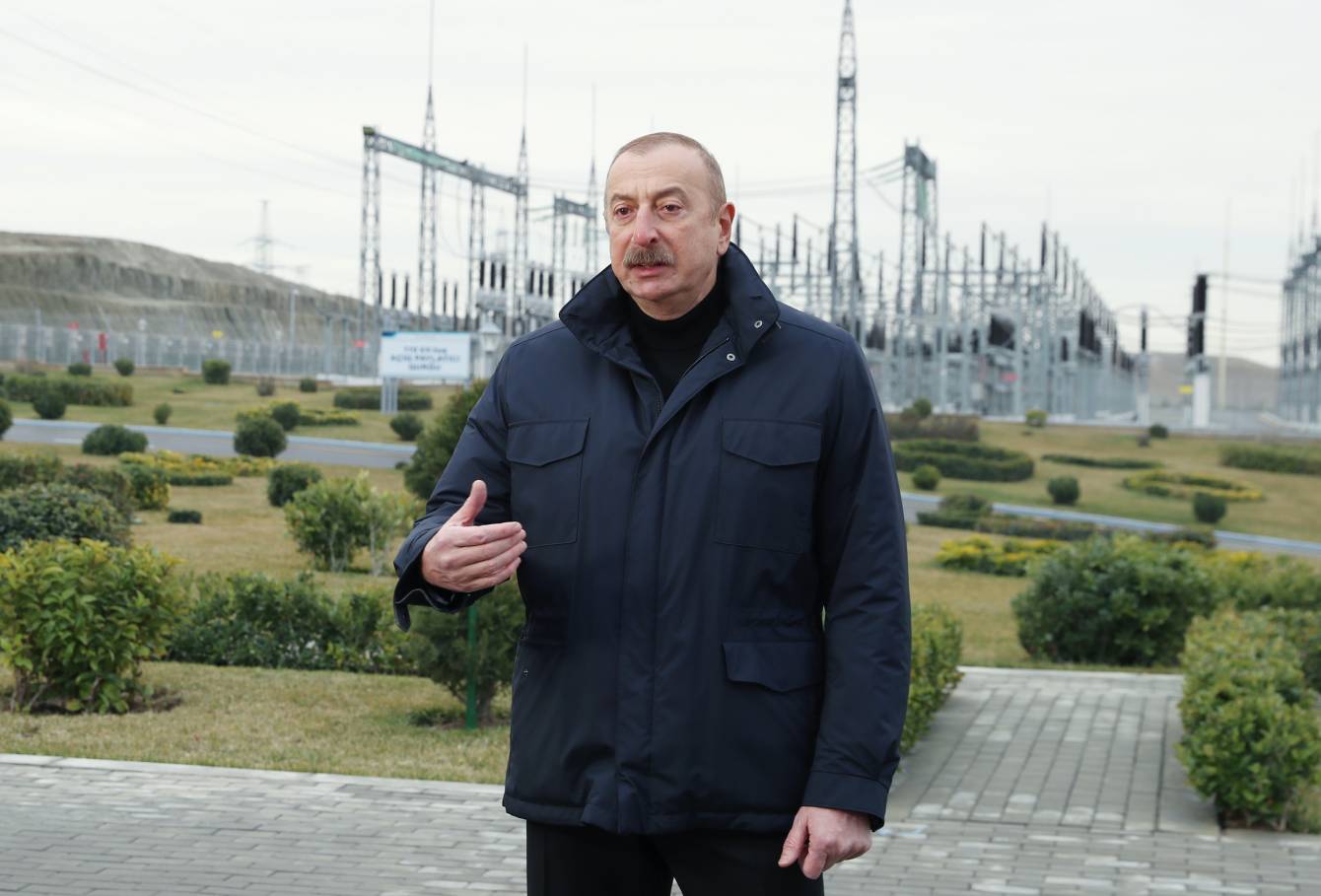Azerbaijan’s President Ilham Aliyev gave a broad insight into the country’s plans to leverage the vast renewable energy potential through local and foreign investments.
Baku has been doing serious work to fully engage the national non-conventional energy sources, and results are already visible, according to President Aliyev.
“Last month, a groundbreaking ceremony was held under a contract signed between “ACWA Power,” one of the largest companies in the field, and Azerbaijan. A 240-megawatt wind farm will be commissioned next year,” the president said in an interview with the state news agency last week.
“Negotiations are underway with BP to build a solar power plant with a capacity of more than 200 megawatts in Jabrayil district. Negotiations are underway with “Masdar” of the United Arab Emirates to build a solar power plant,” he added.
In January 2022, the ground was broken for a wind power plant in Azerbaijan’s Absheron and Khizi districts. ACWA Power, a Saudi energy giant, partly owned by Saudi Arabia’s sovereign Public Investment Fund, will reportedly invest $300 million in the project. The “Khizi-Absheron” wind power plant is expected to churn out 1 billion kilowatt-hours (kWh) of electricity per annum. The plant will be commercially operable in the third quarter of 2023.
Last year, Azerbaijan’s Energy Ministry and BP inked an agreement to evaluate and implement a photovoltaic power station plant in Jabrayil, one of the Azerbaijani districts liberated from the Armenian occupation. A “green energy” zone will be established in the liberated territories under the project, which sits well with Azerbaijan’s commitment to reduce carbon emissions by 35 percent by 2030 and BP’s long-term “net zero emissions” goal set for 2050. The agreement ushers in cooperation for technical and commercial evaluation of the solar energy project, plant design, financing provision, and final investment decision adoption through a jointly managed committee.
In January 2020, UAE’s Masdar secured a contract with Azerbaijan’s Energy Ministry for developing, building, and operating a 230-megawatt (MW) solar power park on the outskirts of the capital Baku. The investment agreement for the project was signed last year.
The renewable energy projects implemented by ACWA Power and Masdar are expected to help Azerbaijan save 300 million cubic meters of natural gas, equal to 10 percent of the total volume of blue fuel consumed by the country’s population annually.
Meanwhile, President Aliyev said Azerbaijan was working with Iran to launch the “Khudafarin,” the third-largest hydropower station in Azerbaijan, and “Giz Galasi” reservoirs over the Araz river. The power plants will jointly produce 716 million kilowatt-hours of electricity annually. Both facilities are expected to come online sometime in 2022.
The Azerbaijani government has so far commenced four hydropower plants - “Gulabird,” “Sugovushan-1,” “Sugovushan-2,” and “Kalbajar” - in the country’s liberated lands. Five more hydropower plants, including those with the capacity of 25-30 MW, will be constructed in these territories in 2022.
According to President Aliyev, there are also some proposals to leverage the renewable energy potential of the Azerbaijani sector of the Caspian Sea. Estimates put the capacity of the Caspian Sea for renewable energy production at more than 150,000 MW.
According to a report released by the energy ministry, about 25.3 billion kWh of electricity was produced in Azerbaijan in January-November 2021. Thermal power plants generated 23.76 billion kWh of the overall production, while the hydropower plants came in at number two with nearly 1.2 billion kWh. Wind parks generated 82.7 million kWh, while solar power stations and biomass churned out 51.9 million kWh and 172.5 million kWh of electricity, respectively.
Renewables are expected to make up 30 percent of the country’s electricity generation by 2030. Estimates put the renewable energy potential of Azerbaijan at 37,000 MW, ten thousand of which has been unveiled after the liberation of the country’s territories from the Armenian occupation in 2020.
The potential of wind power for enhancing the replenishable energy capability of Azerbaijan stands at 59.2 percent of the overall renewable sources, according to a report “Market Analysis Azerbaijan 2019” published by the German-Azerbaijani Chamber of Commerce.
Meanwhile, according to the same publication, solar power comes in at number two with a total of 8,000 MW potential. Biomass, geothermal, and hydropower (excluding large hydropower stations) are also introduced as promising renewables at 900 MW, 800 MW, and 650 MW, respectively.







 Armenian sappers commenced on Monday mine-clearance operations in the territories adjacent to the Saint Mary Church in village of Voskepar (Armenia...
Armenian sappers commenced on Monday mine-clearance operations in the territories adjacent to the Saint Mary Church in village of Voskepar (Armenia...
 Russian Foreign Minister Sergei Lavrov has reasserted that Moscow has no intentions to stop the fighting in Ukraine, even if peace talks commence.
Russian Foreign Minister Sergei Lavrov has reasserted that Moscow has no intentions to stop the fighting in Ukraine, even if peace talks commence.
 Iran has refuted reports of alleged damage to Shimon Peres Negev Nuclear Research Centre located southeast of Dimona, Israel, during the recent air...
Iran has refuted reports of alleged damage to Shimon Peres Negev Nuclear Research Centre located southeast of Dimona, Israel, during the recent air...
 Iran and Pakistan have signed eight cooperation documents in various fields, and agreed to strengthen ties to fight terrorism in the region.
Iran and Pakistan have signed eight cooperation documents in various fields, and agreed to strengthen ties to fight terrorism in the region.



